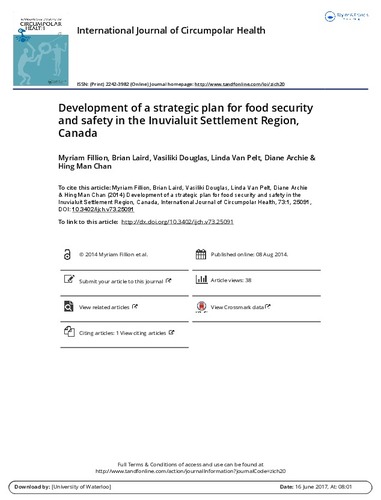UWSpace will be migrating to a new version of its software from July 29th to August 1st. UWSpace will be offline for all UW community members during this time.
Development of a strategic plan for food security and safety in the Inuvialuit Settlement Region, Canada
| dc.contributor.author | Laird, Brian | |
| dc.contributor.author | Fillion, Myriam | |
| dc.contributor.author | Douglas, Vasiliki | |
| dc.contributor.author | Van Pelt, Linda | |
| dc.contributor.author | Archie, Diane | |
| dc.contributor.author | Chan, Hing Man | |
| dc.date.accessioned | 2017-06-16 15:32:00 (GMT) | |
| dc.date.available | 2017-06-16 15:32:00 (GMT) | |
| dc.date.issued | 2017-06-08 | |
| dc.identifier.uri | http://dx.doi.org/10.3402/ijch.v73.25091 | |
| dc.identifier.uri | http://hdl.handle.net/10012/12017 | |
| dc.description.abstract | Background. Current social and environmental changes in the Arctic challenge the health and well-being of its residents. Developing evidence-informed adaptive measures in response to these changes is a priority for communities, governments and researchers. Objectives. To develop strategic planning to promote food security and food safety in the Inuvialuit Settlement Region (ISR), Northwest Territories (NWT), Canada. Design. A qualitative study using group discussions during a workshop. Methods. A regional workshop gathered Inuit organizations and community representatives, university-based researchers from the Inuit Health Survey (IHS) and NWT governmental organizations. Discussions were structured around the findings from the IHS. For each key area, programs and activities were identified and prioritized by group discussion and voting. Results. The working group developed a vision for future research and intervention, which is to empower communities to promote health, well-being and environmental sustainability in the ISR. The group elaborated missions for the region that address the following issues: (a) capacity building within communities; (b) promotion of the use of traditional foods to address food security; (c) research to better understand the linkages between diseases and contaminants in traditional foods, market foods and lifestyle choices; (d) and promotion of affordable housing. Five programs to address each key area were developed as follows: harvest support and traditional food sharing; education and promotion; governance and policy; research; and housing. Concrete activities were identified to guide future research and intervention projects. Conclusions. The results of the planning workshop provide a blueprint for future research and intervention projects. | en |
| dc.description.sponsorship | ArcticNet | en |
| dc.language.iso | en | en |
| dc.publisher | Taylor & Francis | en |
| dc.rights | Attribution 4.0 International | * |
| dc.rights.uri | http://creativecommons.org/licenses/by/4.0/ | * |
| dc.subject | Food security | en |
| dc.subject | Health | en |
| dc.subject | Inuit | en |
| dc.subject | Inuvialuit Settlement Region | en |
| dc.subject | Workshop | en |
| dc.subject | Planning | en |
| dc.subject | Participatory approach | en |
| dc.title | Development of a strategic plan for food security and safety in the Inuvialuit Settlement Region, Canada | en |
| dc.type | Conference Paper | en |
| dcterms.bibliographicCitation | Fillion, M., Laird, B., Douglas, V., Van Pelt, L., Archie, D., & Chan, H. M. (2014). Development of a strategic plan for food security and safety in the Inuvialuit Settlement Region, Canada. International Journal of Circumpolar Health, 73(1), 25091. https://doi.org/10.3402/ijch.v73.25091 | en |
| uws.contributor.affiliation1 | Faculty of Applied Health Sciences | en |
| uws.contributor.affiliation2 | Public Health and Health Systems (School of) | en |
| uws.typeOfResource | Text | en |
| uws.peerReviewStatus | Reviewed | en |
| uws.scholarLevel | Faculty | en |


